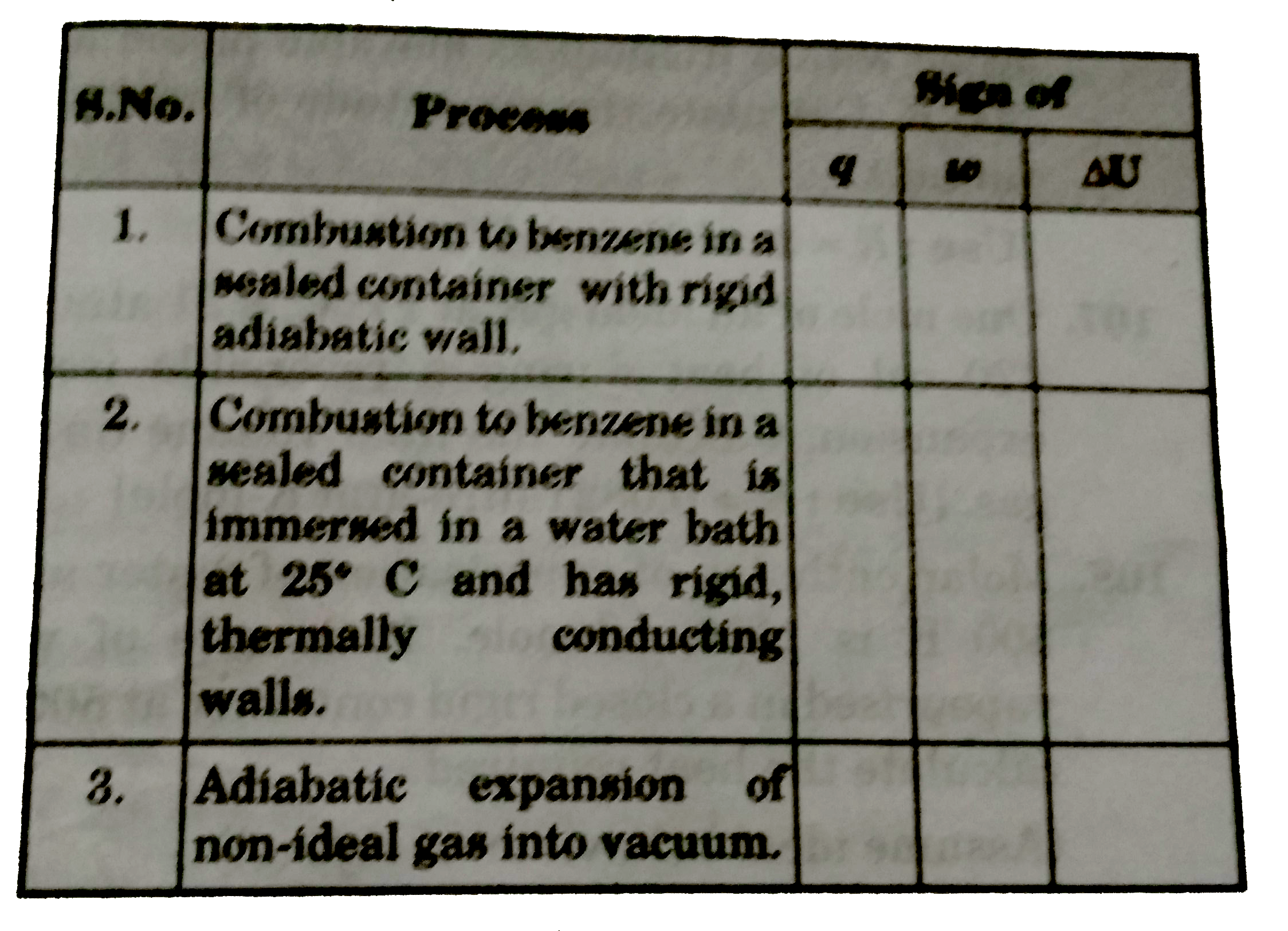ΔE=0 for which process
Cyclic process
Isothermal expansion
Isochoric process
Adiabatic process
The correct Answer is:A, B
To determine for which process the change in internal energy (ΔE or ΔU) is zero, we will analyze the four types of thermodynamic processes: cyclic, isothermal, isochoric, and adiabatic.
1. Understanding ΔU:
- ΔU represents the change in internal energy of a system. It is a state function, meaning it depends only on the initial and final states of the system, not on the path taken.
2. Cyclic Process:
- In a cyclic process, the system returns to its initial state after completing a cycle. Therefore, the initial and final states are the same.
- Since ΔU depends only on these states, for a cyclic process, ΔU = U_final - U_initial = 0.
- Conclusion: ΔU = 0 for cyclic processes.
3. Isothermal Process:
- In an isothermal process, the temperature remains constant (ΔT = 0).
- The change in internal energy for an ideal gas is given by ΔU = Cv * ΔT, where Cv is the heat capacity at constant volume.
- Since ΔT = 0, it follows that ΔU = Cv * 0 = 0.
- Conclusion: ΔU = 0 for isothermal processes.
4. Isochoric Process:
- In an isochoric process, the volume remains constant (ΔV = 0).
- The work done (W) is given by W = -PΔV, which equals 0 since ΔV = 0.
- According to the first law of thermodynamics, ΔU = Q + W. Since W = 0, ΔU = Q, which is not necessarily zero (it depends on the heat added or removed).
- Conclusion: ΔU ≠ 0 for isochoric processes.
5. Adiabatic Process:
- In an adiabatic process, there is no heat exchange with the surroundings (Q = 0).
- Using the first law of thermodynamics, ΔU = Q + W = 0 + W = W. Thus, ΔU is equal to the work done, which is not necessarily zero.
- Conclusion: ΔU ≠ 0 for adiabatic processes.
Final Answer:
The change in internal energy (ΔU) is zero for:
- Cyclic Process (Option 1)
- Isothermal Process (Option 2)
- ΔU represents the change in internal energy of a system. It is a state function, meaning it depends only on the initial and final states of the system, not on the path taken.
- In a cyclic process, the system returns to its initial state after completing a cycle. Therefore, the initial and final states are the same.
- Since ΔU depends only on these states, for a cyclic process, ΔU = U_final - U_initial = 0.
- Conclusion: ΔU = 0 for cyclic processes.
- In an isothermal process, the temperature remains constant (ΔT = 0).
- The change in internal energy for an ideal gas is given by ΔU = Cv * ΔT, where Cv is the heat capacity at constant volume.
- Since ΔT = 0, it follows that ΔU = Cv * 0 = 0.
- Conclusion: ΔU = 0 for isothermal processes.
- In an isochoric process, the volume remains constant (ΔV = 0).
- The work done (W) is given by W = -PΔV, which equals 0 since ΔV = 0.
- According to the first law of thermodynamics, ΔU = Q + W. Since W = 0, ΔU = Q, which is not necessarily zero (it depends on the heat added or removed).
- Conclusion: ΔU ≠ 0 for isochoric processes.
- In an adiabatic process, there is no heat exchange with the surroundings (Q = 0).
- Using the first law of thermodynamics, ΔU = Q + W = 0 + W = W. Thus, ΔU is equal to the work done, which is not necessarily zero.
- Conclusion: ΔU ≠ 0 for adiabatic processes.
The change in internal energy (ΔU) is zero for:
- Cyclic Process (Option 1)
- Isothermal Process (Option 2)
Similar Questions
How many of the following statement(s) is/are true for free expansion of ideal gas in an insulated container ?
1. It is a Reversible process.
2. ΔH=0, for this process.
3. ΔE=0, for this process.
4. Δ(PV)=0
5. ΔT=0 , for this process.
6. ΔSsurrounding=0, for this process.
7. ΔSsystem=0, for this process.
8. ΔStotal=0, for this process.View SolutionPredict the sign of q, w andΔU for given process.

Hence , find number of process for which at least one of q,w, ΔU,ΔH are zero.View Solution
Knowledge Check
- Question 1 - Select One
In case of an ideal gas undergoing transformation where Delta T = 0 for the process, its internal energy ______.
Aincreases as the pressure increasesBdecreases as the volume decreasesCdecreases as the pressure decreasesDremains fixed - Question 2 - Select One
River Delta Formation is a result of which process?
AErosionBEvaporationCSedimentationDDeposition - Question 3 - Select One
For a certain process, ΔH=280 kJ and ΔS=140JK−1mol−1 . What is the minimum temperature at which the process will be spontaneous?
A2000 KB1200 KC1400 KD1420 K
A process has ΔH=200 J mol−1 and ΔS=40 JK−1mol−1. Out of the values given below, choose the minimum temperature above which the process will be spontaneous :
View SolutionA process has ΔH=8KJmol−1 and ΔS=80JK−1mol−1 The temperature at which the process will be in equilibrium is ____________ K.
View SolutionA process has ΔH=200Jmol−1 and ΔS=40JK−1mol−1. The minimum temperature above which the process will be spontaneous is ___________K.
View SolutionThe ΔG in the process of melting of Ice at −15∘C is
View SolutionΔU=0 in a noncylic process of an ideal gas. The process
View Solution

